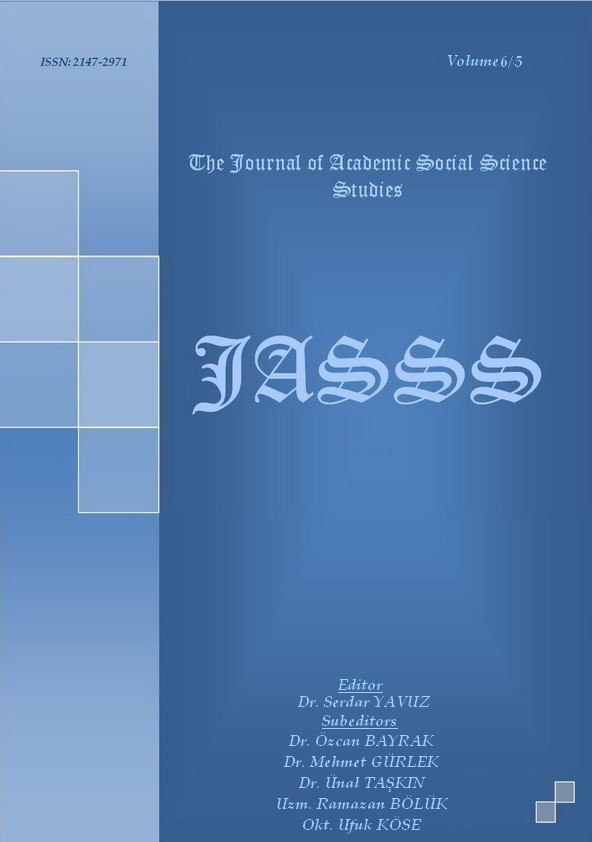OKULÖNCESİ ÖĞRETMEN ADAYLARININ ÖLÇME VE DEĞERLENDİRME ARAÇ VE YÖNTEMLERİNE İLİŞKİN YETERLİLİK ALGILARI (CUMHURİYET ÜNİVERSİTESİ İLE İNÖNÜ ÜNİVERSİTESİ ÖRNEĞİ)
Author :
Abstract
Bu araştırmanın amacı ‘Okulöncesi Öğretmen Adaylarının Ölçme ve Değerlendirme Araç ve Yöntemlerine İlişkin Yeterlilik Algılarını ve Görüşlerini’ belirlemektir. Bu bağlamda okulöncesi öğretmenliği bölümü 4.sınıf öğrencilerinin cinsiyet, üniversite ve mezun oldukları lise türü gibi değişkenlerin araştırma verileri açısından anlamlı farklılık gösterip göstermediğini, ölçme ve değerlendirme araç ile yöntemlerine ilişkin yeterlilik algıları ve görüşlerini incelemektir. Araştırma betimsel bir araştırmadır. Bu doğrultuda veri toplama tekniği olarak hem nicel hem nitel boyutları içeren karma yöntem kullanılmıştır. Araştırma, nicel verilerin elde edilmesinden sonra, nitel verilerle desteklenmiştir. Araştırmada betimsel araştırma deseni olarak ‘Durum Çalışması’ deseninden yararlanılmıştır. Araştırmanın verileri Cumhuriyet Üniversitesi ile İnönü Üniversitesi Eğitim Fakültesi Okulöncesi Öğretmenliği bölümü 4.sınıf öğrencilerinden toplanmıştır. Verilerin çözümlenmesinde nicel boyutunda SPSS istatistiksel program kullanılmıştır. SPSS istatistiksel testlerden Cramer’s V testi, nitel boyutunda ise içerik analizi kullanılmıştır. Sonuçlara göre okulöncesi öğretmen adaylarının cinsiyet, öğrenim görülen üniversite ve mezun olunan lise değişkenine göre anlamlı bir ilişki bulunduğu görülmektedir. Okulöncesi öğretmen adaylarının ölçme ve değerlendirme araç ve yönteme ilişkin yeterlilik algılarının düşük olduğu görülmektedir. Okulöncesi öğretmen adaylarının 36-72 ay olan öğrencilerin gelişim özelliklerine uygun davranışı ölçmek konusunda kendilerini yeterli görmediklerini ve bu yetersizlik durumlarını deneyimli olan okulöncesi öğretmenlerden yardım alarak, öğretmen olarak atandıklarında hizmet içi eğitim almayı ve okulöncesi eğitimde yüksek lisans yapmayı düşündüklerini belirtmişlerdir.
Keywords
Abstract
The aim of this study was to determine qualification perceptions and views of preservice preschool teachers about assessment and evaluation tools and methods. In this context, whether there is significant difference in some variables of 4th year students of preservice preschool teachers, such as sex, the type of high school they graduated from, universities where they are getting education were examined and also their perceptions and opinions about assessment and evaluation of the adequacy of the methods and tools were researched. The research is a descriptive study. In this regard, both quantitative and qualitative data collection techniques used in mixed method in the study. In the study after obtaining quantitative data, quantitative data were supported with qualitative data. In this study, one of the descriptive research designs 'Case Study' pattern was used. The data were obtained from preservice preschool teachers getting education in the fourth year from Inonu and Cumhuriyet University. SPSS statistical program was used for the quantitative analysis of the data. While Cramer's V test used in quantitative part SPSS statistical tests, for the qualitative part, content analysis was used. According to the results, variables of preservice preschool teachers' gender, education and graduated high school and the university seems to have a significant relationship . In this context, it is found that preservice preschool teachers' perceptions of the adequacy of assessment and evaluation tools and methods are lower. These preservice preschool teachers felt inadequate in measuring and assessing children’s behaviors from 36 to 72 months. They plan to eliminate these deficiencies by consulting to the preschool teachers who are experienced in the profession, by getting in-service training when they assigned and by getting higher level education such as master degree.





